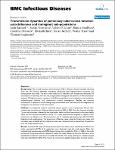Transmission dynamics of pulmonary tuberculosis between autochthonous and immigrant sub-populations
Barniol, Judit
Niemann, Stefan
Louis, Valérie R
Brodhun, Bonita
Dreweck, Caroline
Richter, Elvira
Becher, Heiko
Haas, Walter
Junghanss, Thomas
Background: The overall incidence of tuberculosis (TB) in Western Europe has been declining since the 19th Century. However, immigrant sub-groups from high-prevalence countries are slowing down this trend. The aim of this study was to describe how immigration influences TB transmission in Germany. For that we prospectively investigated the dynamics of TB transmission between TB high-prevalence immigrant and TB low-prevalence local populations with molecular epidemiological methods and conventional contact investigations. Besides, we assessed transmission in relation to social mixing using an innovative tool that measures the integration of immigrants into the local social environment. Methods: A prospective study of confirmed culture positive cases of pulmonary TB and their contacts was carried out in a German federal state from 2003 to 2005. Data for the study included: 1) case data routinely collected by the local public health staff and transmitted to the state health office and the national surveillance centre, 2) a study questionnaire designed to capture social interactions of relevance for TB transmission and 3) molecular genotyping data (IS6110 DNA fingerprint and spoligotyping). The proportion of German cases caused by foreign-born cases, and vice versa, was estimated and an integration index was computed using a selected set of questions from the study questionnaire. Results: A total of 749 cases of culture-positive pulmonary tuberculosis voluntarily enrolled in the study, representing 57.8% of all registered cases diagnosed over the study period. Data that included study questionnaire and DNA fingerprinting were available for 41% (n = 308) of the study participants. Forty-seven clusters, defined as a least two cases infected by the same TB strains, were identified by molecular methods and included 132 (17%) of the study participants. Epidemiological links were identified for 28% of the clusters by conventional epidemiological data. In mixed clusters, defined as clusters including German and foreign-born individuals, the probability of cases to be caused by foreign-born cases was estimated at 18.3%. We observed a trend to mixed clusters with increasing time spent by immigrants in the host country. This group also presented comparatively higher integration indexes than immigrants in immigrant-only clusters. Conclusion: Our results confirm the findings of other studies that there is no significant TB transmission from TB high-prevalence immigrant to TB low-prevalence autochthonous population. This may be explained by the good performance of tuberculosis screening programmes for certain groups arriving in Germany from high- prevalence countries, by a low degree of mixing of immigrants with the local population or by a combination of both.
No license information

